ThruNite Catapult V2 XM-L


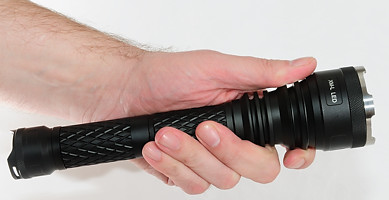
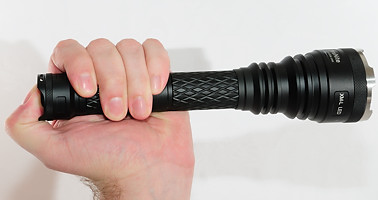
ThruNite started with a small keychain light and then moved on to a big thrower light, improved the light (Catapult V2) and have now changed led in the improved version to the newest high power led on the market. This improvement can be either more light or longer runtime or a combination. In the comparison I will compare it to the old V2 and see how much brighter the new led is.
The light is supplied as a short light and an extender, but for most uses the only useable configuration is with the extender. The light has only two brightness settings, controlled with tight/loose head and no flashing settings. The tail switch only controls on/off. With only two levels and no flashing modes, the light does not need a microprocessor, making the driver simpler. The light is made of aluminum with hard-anodized (Type 3) finish.
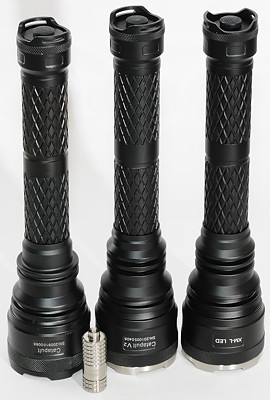
All 3 versions of the Catapult: Catapult, Catapult V2 and Catapult V2 XM-L. In front is the keychain light.

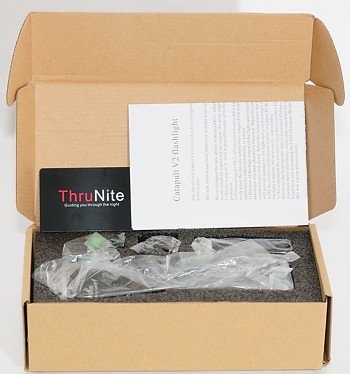
The light arrives in a simple cardboard box.
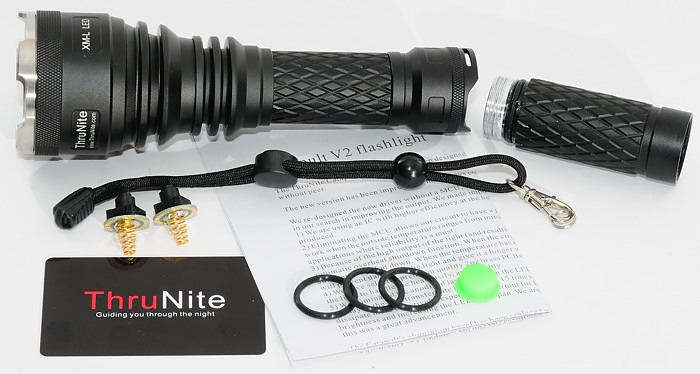
The contents of the box is: flashlight with extension tube, lanyard with split ring, 3 spare o-rings, a GITD (Glow in the Dark) boot for the tail switch, manual, warranty card and 2x spare tail switch.
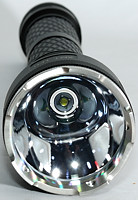
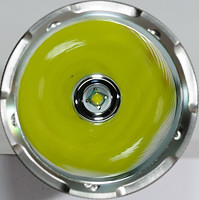
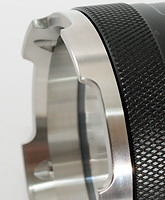
The light has a smooth reflector with a Cree XM-L led at the bottom. With the stainless steel bezel the front of the light can take a lot of punishment.
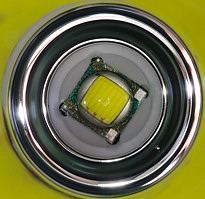
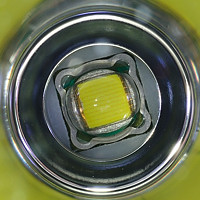
A closer look at the led on V2 XM-L and V2. The V2 uses a SST-50 led and it can be recognized on the metal around the led.
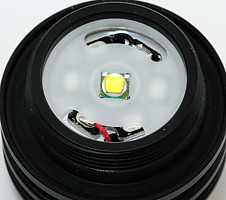
It is very easy to get access to the led and it is mounted on a star, making it easy to swap it.
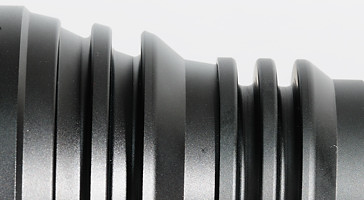
The head has a design with some fins to improve cooling, this is important to get rid of the heat the led generates. My test shows that the Cat has ample cooling with this design.
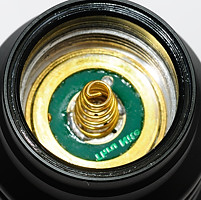
The head connects to the battery with a spring, this makes it possible to use flat top batteries in the light. The golden ring on the circuit board is the switch for high, i.e. when the head is tight the top of the battery tube has connection to the golden ring and the light is in high mode. For low mode power is supplied through the threads.
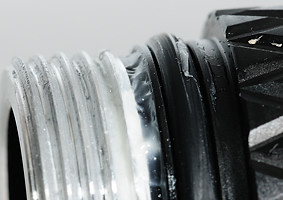
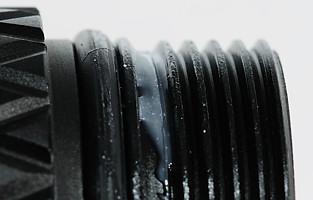
The front threads are triangular without anodizing, because they are part of the current path. At the tailcap the threads are anodized, making it possible to lock out the light. The light has o-rings at all threads.
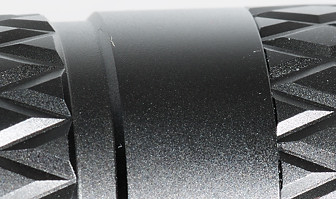
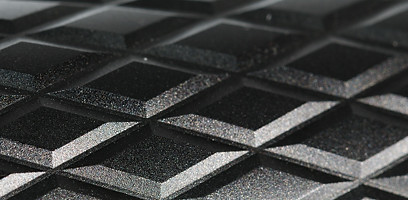
The body of the light consists of a two part battery tube. The connection between the two parts is very nicely done. Except for the connection, the battery tube is covered in a diamond pattern that gives a good grip. Both the head and the tail has a larger diameter than the body, this also reduces the risk of the light sliding out of the hand.
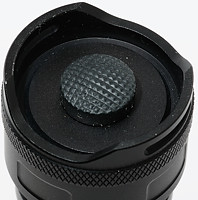
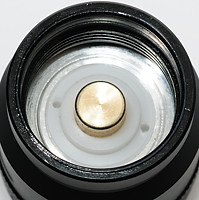
The tail allows tail standing and has holes for mounting the lanyard. The light is mounted with a black rubber boot and has a forward switch under it, i.e. a light press will give momentary light, pressing harder will lock on. In the tail there is a cap over the spring.
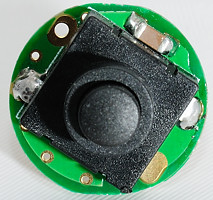
Here is one of the spare tail switches, looking at it there are more than just the switch, there is a small component beside the switch. It is a 10uF capacitor that is wired parallel to the switch. I wonder if this is the reason for two spares, a capacitor mounted directly over a switch will increase the wear on the switch.

Here is all the part the light can be disassembled in without tools. Be careful when selecting brightness, it is the connection between battery tube and head that has to be loosened. Note that the extender is mounted closest to the head.
I still like the Catapult with its simple user interface, the change to XM-L is a small but significant improvement. It has increased the output with lower power consumption (i.e. longer runtime), this is always good. The general construction of the light is very solid with a stainless steel bezel and a thick aluminium body. The best power for the light is still 2x18650 batteries, but the reduced current draw makes it also acceptable to use 4xCR123 batteries.
Technical specification and measurements
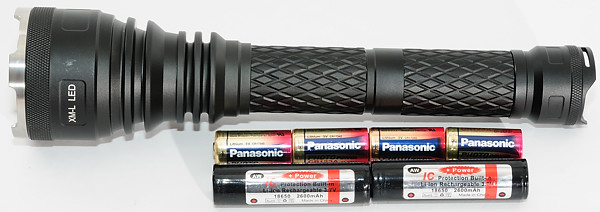
With the extender tube the light can run on either 2x18650 or 4xCR123 batteries, without extender it really need 2x16340 IMR cells (On low it can also use 2xCR123), but this would give a very short runtime. I will restrict my measurements to the full length light.
Measured size and weight:
Length: 255 mm
Diameter: 30 to 59 mm
Weight: 531 gram with 2x18650, 505 gram with 4xCR123
The light uses a Cree XM-L T6 led.

In the above table I have both modes with both 18650 and CR123 batteries. The runtime estimate uses 2600mAh for 18650 and 1400mAh for CR123. The current draw is less than the V2 Catapult, this means longer runtime.
The estimated lumen is scaled from the specified maximum and shows that low is higher than specified. The brightness is a relative measurement from a lux meter.
Note: For the V2 light I used 2200 mAh 18650 batteries!
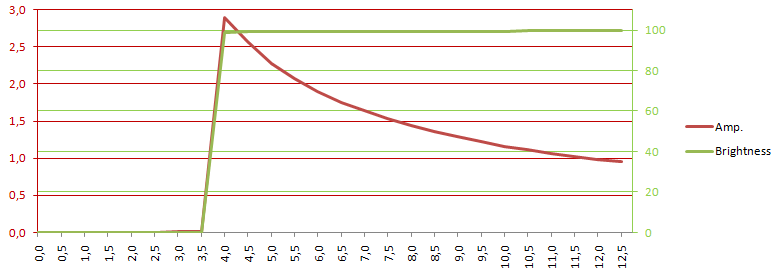
The voltage sweep shows a light with very good stabilizing down to 4 volt. A interesting observation is that the light uses 3 ampere, just before it shuts down, this current is fine for 18650 batteries but on the high side for CR123 batteries.
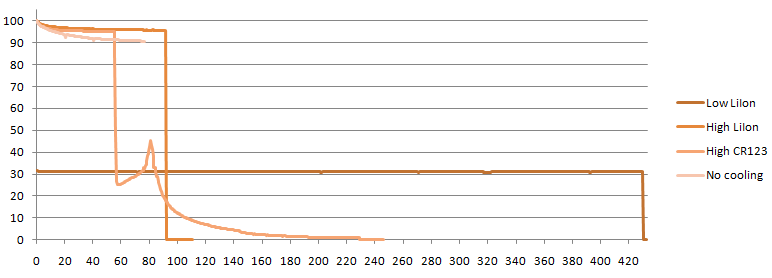
The good stabilization gives a very flat runtime curve. This version of Catapult has a lower current consumption than the first V2 and this reduction gives a nice increase in runtime, especially on CR123.
The light is supposed to have a build in temperature sensor that will shut the light down if it get to hot. To test it I did a runtime without any cooling, after 1 hour the temperature of the light was increased to 50 degree centigrade, on the cooling fins, without the light shutting down, it only had a slight drop in output.
There are no curves of the light to show, the light has no flashing modes and no pwm.
Comparison to other Flashlights
For other big lights see Beamshot of 14 big lights, September 2010.
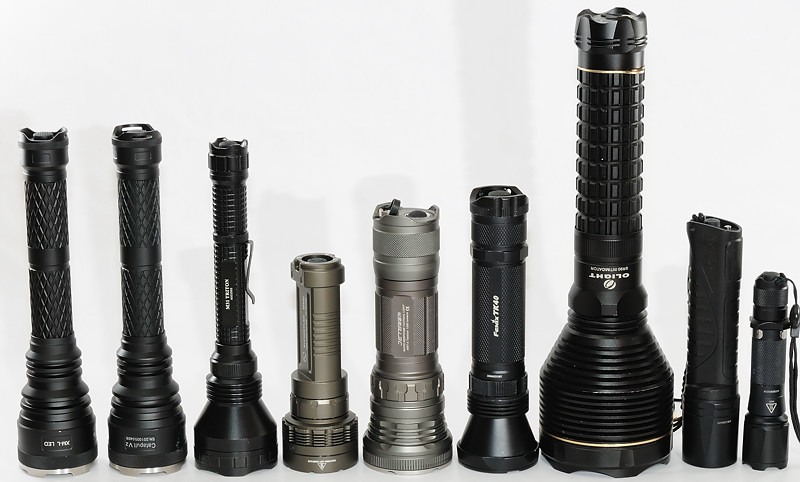

I have compared the new Catapult to a couple of different lights, but no other light has the new XM-L led. The following lights are included (Same sequence as pictures): Catapult V2 XM-L, Catapult V2, OLight M31, Sunwayman M40C, JetBeam RRT-3, Fenix TK40, OLight SR90, Fenix LD40, Fenix TK15
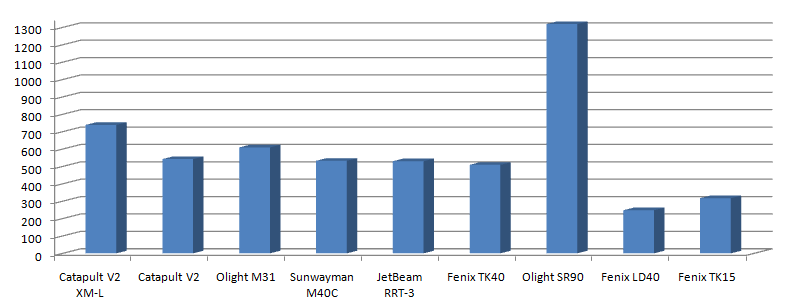
The Catapult XM-L is more powerful than the old V2 Catapult or any other light with a SST-50 or MC-E led. The only lights (with a single emitter) that can surpass it is SST-90 with about twice the output or a HID light.
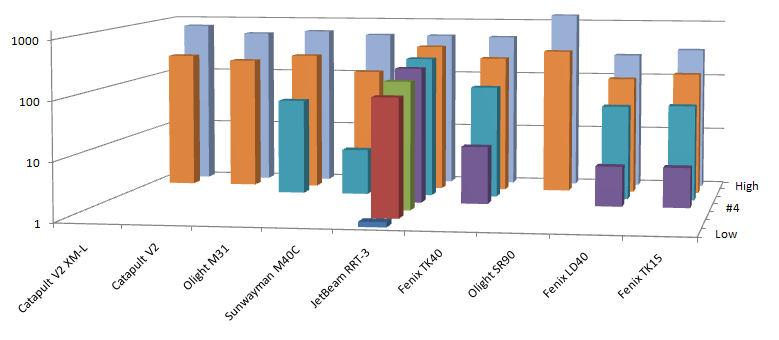
Collecting all brightness settings in same chart with log scaling, shows that the Catapults has two bright levels and no really low levels.
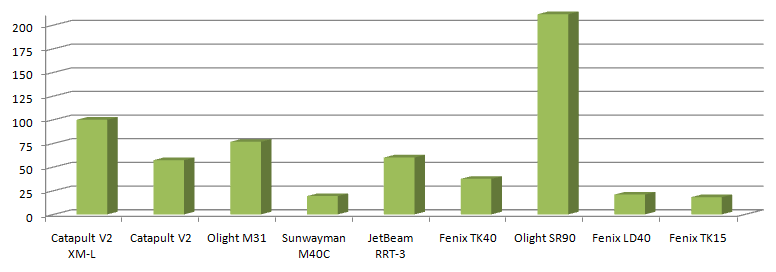
Here I have measured lux at 4 meters to get a estimate of throw. The higher output and the slightly different shape of the new led both increases throw, making the Cat XM-L better than any SST-50 or MC-E led light that I have tested before.
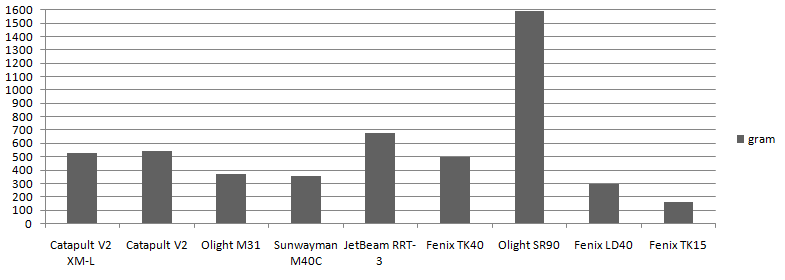
The Catapults are heavy for the size (2*18650), but that is not surprising with the thick and solid body they have.

In this table I have tried to collect the key features of each light. For the user interface I use the following abbreviations: TS: Tail switch, SS: Side switch, ETS:Electronic tail switch, ESS: Electronic side switch, Head: Loosing/tighten the head is used in the ui, Ring: A ring is used in the ui.
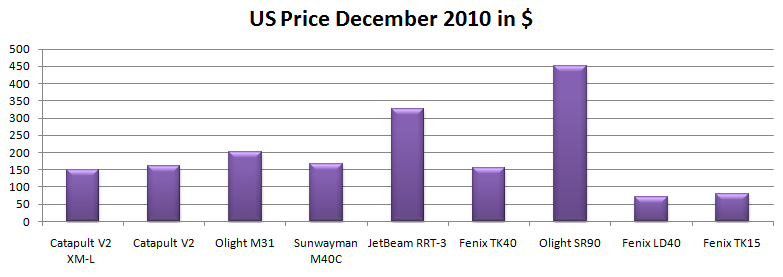
I have checked some US websites for a price estimate of the different lights.
Beamprofile at max. power
Catapult V2 XM-L, Catapult V2, OLight M31
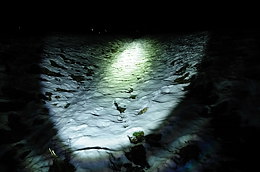
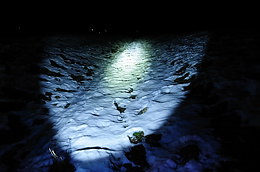
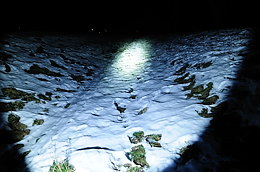
Sunwayman M40C, JetBeam RRT-3, Fenix TK40
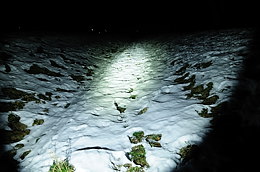
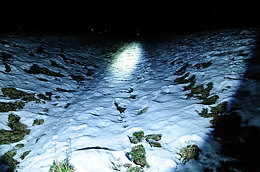
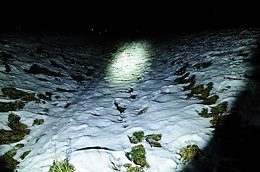
OLight SR90, Fenix LD40, Fenix TK15
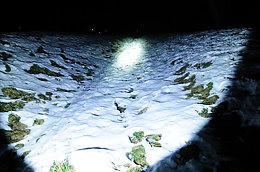
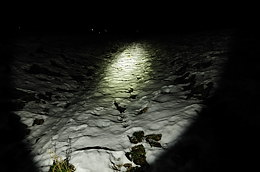
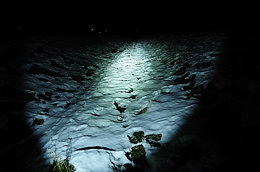
Beamprofile at max. power, decreased exposure
Catapult V2 XM-L, Catapult V2, OLight M31
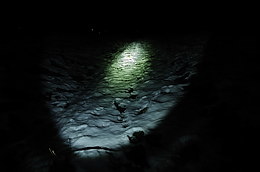
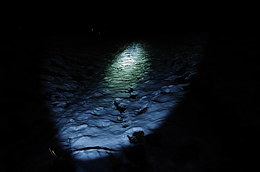
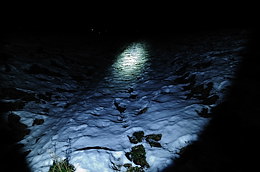
Sunwayman M40C, JetBeam RRT-3, Fenix TK40
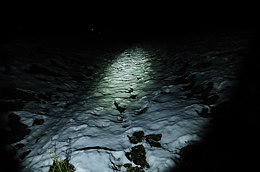
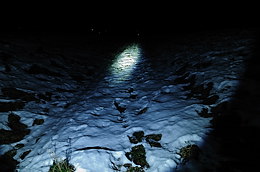
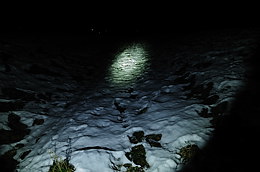
OLight SR90, Fenix LD40, Fenix TK15
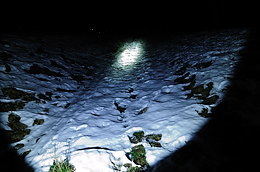
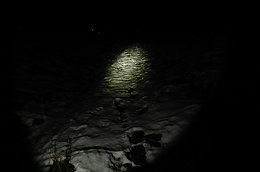
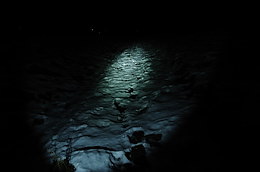
Beamprofile at min. power
Catapult V2 XM-L, Catapult V2, OLight M31
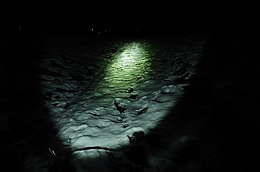
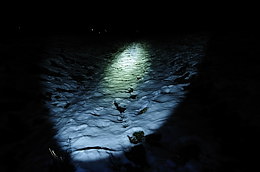
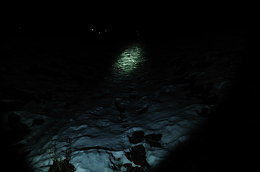
Sunwayman M40C, JetBeam RRT-3, Fenix TK40



OLight SR90, Fenix LD40, Fenix TK15
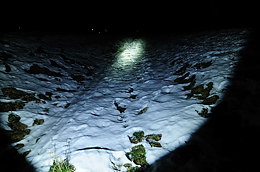


Beamprofile at min. power, increased exposure
Catapult V2 XM-L, Catapult V2, OLight M31
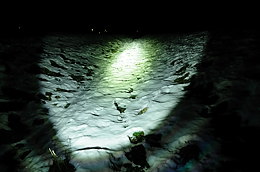
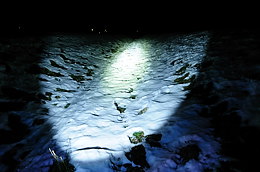
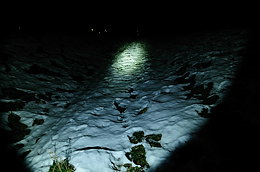
Sunwayman M40C, JetBeam RRT-3, Fenix TK40
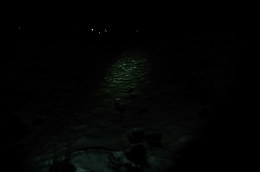

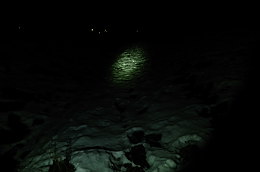
OLight SR90, Fenix LD40, Fenix TK15
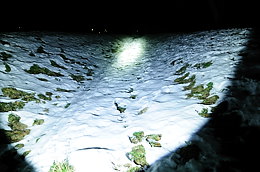
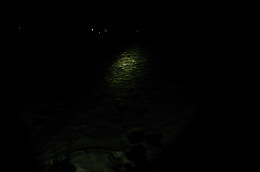
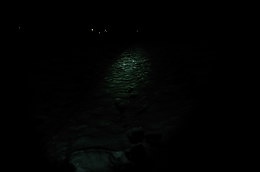
Tree at 12 meters
Catapult V2 XM-L, Catapult V2, OLight M31
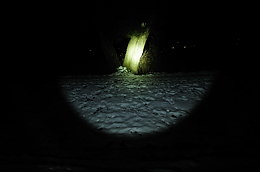
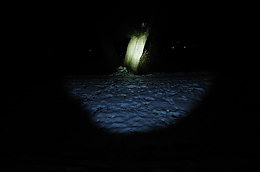
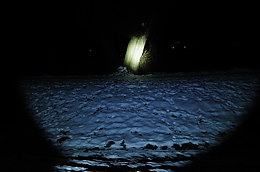
Sunwayman M40C, JetBeam RRT-3, Fenix TK40
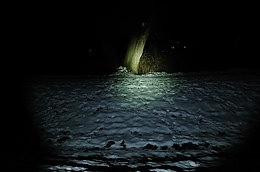
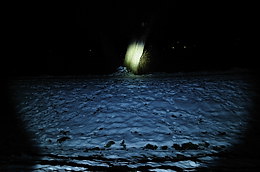
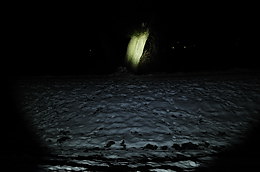
OLight SR90, Fenix LD40, Fenix TK15
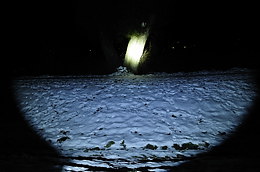
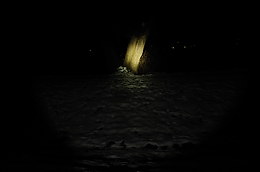
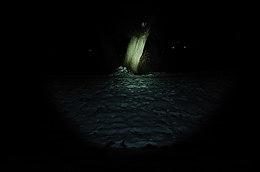
Trees at 100 meters
Catapult V2 XM-L, Catapult V2, OLight M31
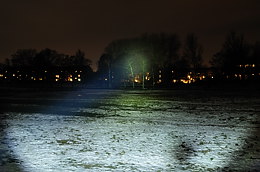
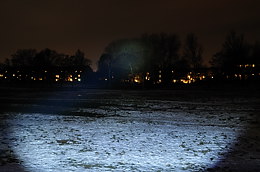
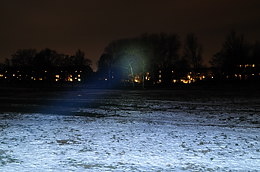
Sunwayman M40C, JetBeam RRT-3, Fenix TK40

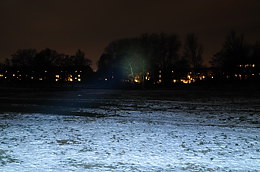

OLight SR90, Fenix LD40, Fenix TK15
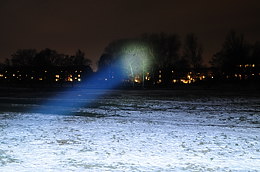


Dark reference

Catapult V2 XM-L

Low, high:


12 meter, 100 meter:


Catapult V2

Read more about the light and see pictures and measurements in my review.
Low, high:


12 meter, 100 meter:


OLight M31

Read more about the light and see pictures and measurements in my review.
Low, medium, high:

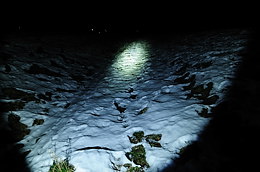

12 meter, 100 meter:


Sunwayman M40C
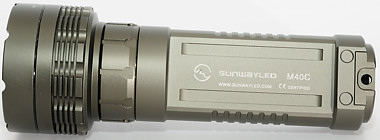
Read more about the light and see pictures and measurements in my review.
A beamshot of M40C and other lights with colored lights can be found here.
Low, medium, high:

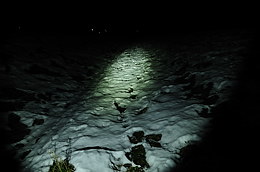

Blue, red:
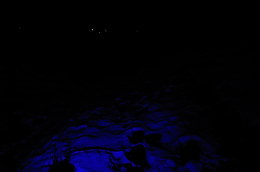
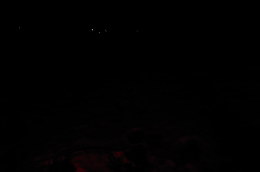
12 meter, 100 meter:


JetBeam RRT-3
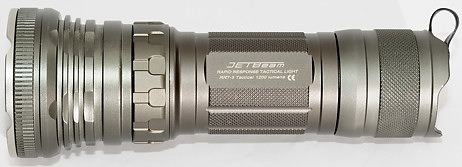
Read more about the light and see pictures and measurements in my review.
Low, #2, #3:

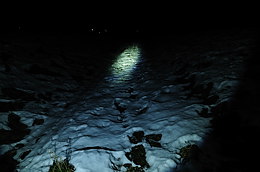
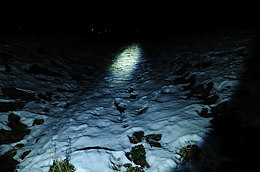
#4, #5, #6:
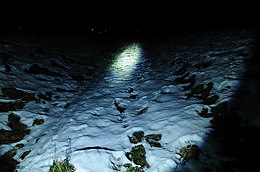
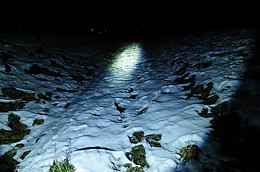
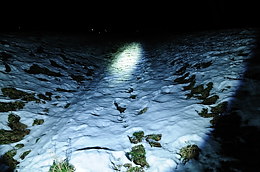
High:

12 meter, 100 meter


Fenix TK40

Read more about the light and see pictures and measurements in my Danish review.
Low, #2, #3:

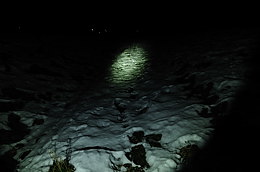
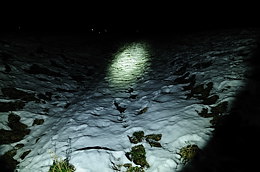
High:

12 meter, 100 meter


OLight SR90

Read more about the light and see pictures and measurements in my Danish review.
Low, high:


12 meter, 100 meter:


Fenix LD40

Low, #2, #3:

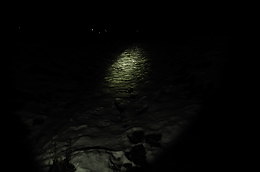
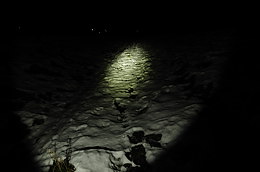
High:

12 meter, 100 meter


Fenix TK15

Low, #2, #3:

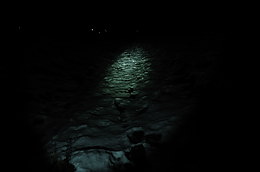
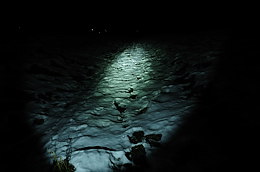
High:

12 meter, 100 meter


Notes
The light was supplied by ThruNite for a review.






















































































































































